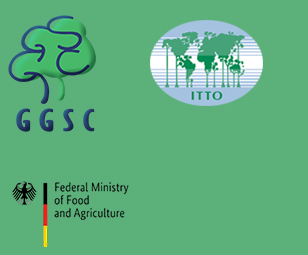
Gabon
Gabon's exports grow by 15.8% in the first quarter of 2025
Latest data from Gabon's Ministry of Economy reveals that the country's export value surged by 15.8% quarter-on-quarter in the first quarter of 2025. Against a backdrop of escalating global geopolitical tensions and mounting trade uncertainties, this performance underscores the resilience of certain strategic sectors within Gabon's economy.
The growth was primarily driven by robust performances in several key sectors, led by minerals, forest products, and rubber. Notably, exports of wood, timber products, and charcoal soared by 60.8%. Specifically, tropical sawnwood exports increased by 16.8%, while exports of veneers, plywood, and wood no thicker than 6 millimeters saw explosive growth, recording an astonishing surge of 14,328.1%.
Forestry Economy Forum 2025 convened in Gabon
The Forestry Economy Forum opened in Gabon on September 9, bringing together stakeholders from the government, private sector, financial institutions, and civil society to discuss challenges and opportunities facing the forestry and timber industries.
During the opening ceremony, Maurice Ntossui-Allogo, Gabon’s Minister of Water and Forests, emphasized that forests should not merely serve as a source of revenue but as a sustainable resource generating wealth and prosperity for all people. Currently, forestry accounts for 3.2% of Gabon’s GDP, and he stressed the need to achieve new milestones by enhancing competitiveness and fostering local transformation.
Gabon boasts an 88% forest coverage, spanning approximately 23.7 million hectares. The country has more than 400 exploitable wood species, 60 of which are commercialized and 54 are used for export. Since 2010, the ban on log exports has encouraged local processing, but the forestry and timber sector still accounts for only 6% of exports and 3.2% of GDP.
Gabon inaugurates Logging Truck Monitoring Center
Recently, Gabon launched its Logging Truck Monitoring Center, which relies on modern equipment to locate each logging truck in real time, monitor speed and vehicle registration, identify the owner, and communicate directly with the driver if necessary.
Currently in a pilot phase, the system has been deployed across a fleet of 176 logging trucks operating in Gabon’s Special Economic Zones. If the pilot proves successful, it may be expanded to all 450 logging trucks operating nationwide, as well as other heavy trucks.
Additionally, this initiative paves the way for future advancements, including the potential integration of in-vehicle and external cameras to enhance visibility and control over the road network.
Republic of the Congo
Resources for roads insufficient in the Congo
On September 6, the Road Fund Steering Committee of the Republic of the Congo held its 22nd meeting in Brazzaville. The meeting highlighted that the country’s annual road maintenance needs 50 billion CFA francs, yet currently, only 5 billion CFA francs are allocated for this purpose—far below the required amount. The Ministry of Public Works received an allocation of just 5 to 6 billion CFA francs for 2025, making adequate upkeep of the road network challenging, particularly as the rainy season approaches.
Despite the nation’s priorities in areas such as health and social infrastructure, Elenga Obat Nzenguet, Director-General of the Road Fund, expressed hope that additional resources could be mobilized by the end of the year.
The twelfth edition of the Republic of Congo Economic Update released
On September 23, the World Bank released the twelfth edition of the Republic of Congo Economic Update. The report highlights that the country has considerable assets, driven by its human and natural capital. Its forests, which cover more than 69% of the territory, store nearly 16 billion tonnes of carbon and provide essential ecosystem services.
“For a forest-intensive country like the Republic of Congo, an effective global financing mechanism is essential to turn carbon sequestration services into tangible benefits," said Cheick Fantamady Kanté, World Bank Country Director for Cameroon, Central African Republic, Republic of Congo, Equatorial Guinea, and Gabon. “Estimating the value of these services is a critical first step, enabling policymakers, civil society, and the public at large to quantify and target the necessary compensation.”
Congo tailors PES planning tool
Brazzaville hosted, on 15-16 September 2025, a technical workshop devoted to ‘contextualising’ the payment for environmental services (PES) planning tool financed by the Central African Forest Initiative, CAFI. Congolese specialists and CAFI modellers tested datasets, reviewed assumptions and aligned the software with the Republic of Congo’s realities.
PES is gaining momentum across Central Africa because it links verified ecosystem services to conditional payments, attracting results-based finance from multilateral partners and private buyers of carbon credits. For Congo, whose 23 million-hectare rainforest is the world’s third largest, the tool could monetise avoided deforestation at scale domestically.
Nearly sixty participants from ministries, United Nations agencies, timber companies and civil-society associations debated data granularity and benefit-sharing formulas. Discussions alternated between plenary walkthroughs of the model’s dashboards and smaller breakouts where hydrologists, agronomists and economists reassessed default parameters inherited from global templates.
Ghana
President Mahama engages GCF on boosting climate finance for Ghana
President John Dramani Mahama has reaffirmed Ghana’s commitment to advancing climate action and green economic growth, following high-level talks with the leadership of the Green Climate Fund (GCF) at the Jubilee House in Accra.
The discussions centred on deepening Ghana–GCF collaboration in climate finance and exploring opportunities to scale up funding for sustainable development initiatives.
Established under the United Nations Framework Convention on Climate Change (UNFCCC), the Green Climate Fund is the largest dedicated climate finance mechanism in the world.
It provides funding to developing countries for both mitigation and adaptation projects, working through accredited national, regional, and international entities to promote low-emission, climate-resilient development pathways.
New timber validation committee inaugurated
The Minister for Lands and Natural Resources, Hon. Emmanuel Armah -Kofi Buah, on Friday, September 12, 2025, officially inaugurated the new Timber Validation Committee (TVC) at a brief but solemn ceremony held at the Ministry’s Conference Hall in Accra. This is the third of such, since the establishment of the maiden TVC in 2016.
He further outlined the Committee’s mandate, which includes supervising the licensing of timber for both domestic and international markets, ensuring compliance with the legal and regulatory frameworks, and making key recommendations regarding the implementation of the FLEGT license expected to accompany all wood exports to the European Union. “The credibility of the TVC is critical for both the integrity of our legality system and the confidence of international markets. The local industry, too, will thrive on your fairness, transparency, and efficiency,” he added.

| E-mail:ggsc@itto-ggsc.org | Tel:86-10-62888626 |


Sigh Up for Emails |
|